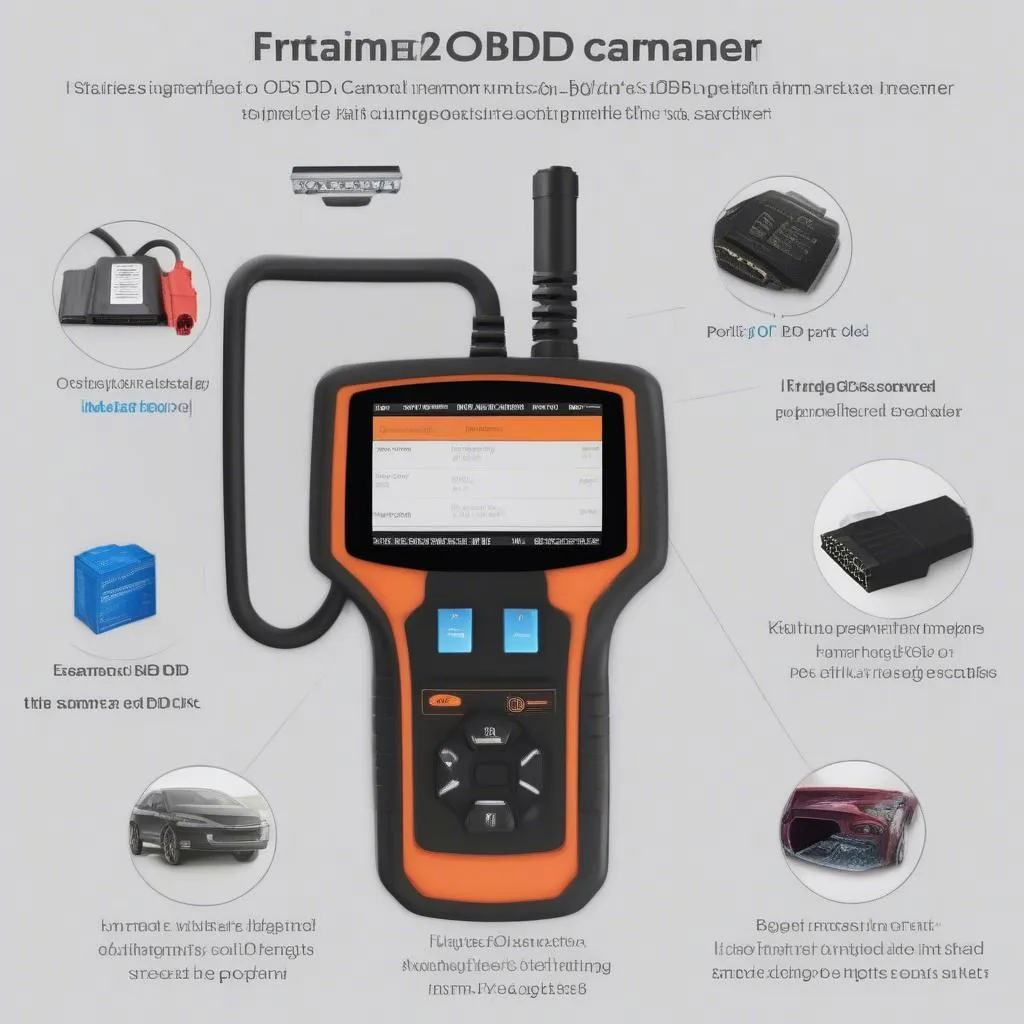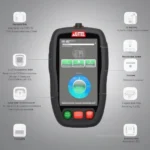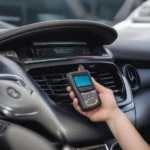Finding the right OBD2 scanner can feel like navigating a maze of technical jargon and confusing features. Whether you’re a car enthusiast wanting to demystify the “check engine” light or a professional mechanic seeking advanced diagnostics, understanding what makes a “good” OBD2 scanner is crucial. This guide cuts through the noise, delivering clear, practical information to help you make an informed decision and find the perfect OBD2 scanner for your needs.
Understanding Your Needs: The First Step to Choosing an OBD2 Scanner
Before diving into the world of OBD2 scanners, ask yourself: “What do I need it for?” Are you looking to:
- Read and clear basic engine codes?
- Diagnose complex engine problems?
- Access and monitor live data streams?
- Perform specific functions like ABS bleeding or TPMS resets?
Clearly defining your requirements will narrow down the search and lead you to the best OBD2 scanner for your specific needs.
Types of OBD2 Scanners: Finding the Right Fit
OBD2 scanners come in a variety of shapes and sizes, each catering to different levels of users:
1. Basic Code Readers:
Ideal for casual users, these affordable scanners read and clear basic engine codes, offering a quick glimpse into why your “check engine” light is on. However, they typically lack advanced features and may not provide detailed code descriptions.
2. Mid-Range Scanners:
Striking a balance between price and functionality, mid-range scanners offer more detailed code definitions, live data viewing, and potentially some advanced functions like ABS or SRS diagnostics. These are great for DIY enthusiasts who want more control over their vehicle maintenance.
3. Professional-Grade Scanners:
Designed for mechanics and experienced professionals, these high-end scanners provide comprehensive diagnostic capabilities, including bi-directional controls, coding, programming, and access to manufacturer-specific data.
Key Features to Consider: Beyond the Basics
Once you’ve determined the type of scanner you need, consider these essential features:
- Vehicle Coverage: Ensure the scanner is compatible with your car’s make, model, and year.
- Code Definitions: Look for scanners that provide clear, concise explanations of error codes.
- Live Data Streaming: This feature allows you to monitor real-time sensor data, aiding in diagnosing intermittent issues.
- Advanced Functions: Depending on your needs, consider scanners offering ABS bleeding, TPMS reset, DPF regeneration, or other specialized functions.
- User Interface: Choose a scanner with an intuitive interface, easy-to-navigate menus, and clear display.
- Software Updates: Regular updates ensure compatibility with new vehicle models and provide access to the latest features.
The Value of Research: Avoiding Buyer’s Remorse
Investing time in research is crucial before purchasing an OBD2 scanner.
- Read Reviews: Explore user reviews and expert opinions to gain insights into real-world performance, durability, and ease of use.
- Compare Features: Create a shortlist of scanners that meet your criteria and compare their features, price, and user feedback.
- Check for Updates: Ensure the manufacturer provides regular software updates to keep your scanner current.
OBD2 Scanners: Empowering Car Owners and Professionals
OBD2 scanners have revolutionized car diagnostics, providing a window into your vehicle’s health. By understanding your needs, researching thoroughly, and considering the key features, you can confidently choose the best OBD2 scanner to unlock your inner mechanic or empower your professional expertise.
FAQs: Common Questions About OBD2 Scanners
1. Can I use any OBD2 scanner on any car?
While most OBD2 scanners work on vehicles sold in the US after 1996, compatibility can vary. Always check the scanner’s documentation to ensure it supports your specific make, model, and year.
2. What does the “check engine” light mean?
The “check engine” light illuminates when your car’s computer detects a problem within the engine or emissions system. An OBD2 scanner can read the specific code triggering the light.
3. Can an OBD2 scanner fix my car?
OBD2 scanners primarily diagnose problems. While some offer functions like resetting the “check engine” light or performing specific resets, they don’t fix mechanical issues.
4. How often should I use my OBD2 scanner?
For routine maintenance, scanning your car every few months or before long trips can help identify potential issues early on.
5. Can I update my OBD2 scanner’s software?
Many manufacturers offer software updates to enhance functionality and compatibility. Check the manufacturer’s website for available updates for your specific model.
Need More Help Choosing the Right OBD2 Scanner?
Choosing the right OBD2 scanner is a crucial decision. Contact us via WhatsApp: +1(641)206-8880 or email us at [email protected]. Our team of experts is available 24/7 to answer your questions and guide you to the perfect scanner for your needs. You can also find more information on what is the best cheap obd2 scanner and how to use can obd2 scanner.


